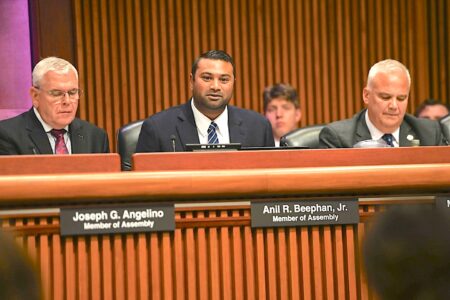National Grid Releases Plan To End Fossil Fuel Use
- National Grid announced plans to provide gas and electricity without fossil fuels by 2050. “This fossil-free vision is an historic announcement for National Grid and the United States,” said CEO John Pettigrew. AP photos
- National Grid announced plans to provide gas and electricity without fossil fuels by 2050. “This fossil-free vision is an historic announcement for National Grid and the United States,” said CEO John Pettigrew. AP photos

National Grid announced plans to provide gas and electricity without fossil fuels by 2050. “This fossil-free vision is an historic announcement for National Grid and the United States,” said CEO John Pettigrew. AP photos
National Grid has a plan to provide gas and electricity without fossil fuels by 2050.
Whether that plan will meet with the state’s approval is another question.
Heating of homes and buildings makes up about 39% of greenhouse gas emissions in Massachusetts and New York. Of the roughly 10 million households in Massachusetts and New York, 57% have a gas furnace or boiler system, 25% use an oil or propane boiler and 14% use electricity, most of which are electric resistance heaters.
In draft climate action plans in New York and Massachusetts, officials propose installing electric heat pumps in nearly 10 million homes by 2050, which would require 340,000 conversions every year until 2050.
Hybrid gas-electric heating systems use both electricity and gas to heat and cool homes. National Grid officials say using a combination of heat pumps and gas furnaces is more reliable, allows installation of less expensive heat pumps and avoid costly modifications to buildings and heating systems.

National Grid announced plans to provide gas and electricity without fossil fuels by 2050. “This fossil-free vision is an historic announcement for National Grid and the United States,” said CEO John Pettigrew. AP photos
National Grid officials propose decarbonizing the natural gas system with renewable natural gas and green hydrogen. Renewable natural gas, the company says, is an immediately available resource released into the atmosphere by decomposing materials at farms, landfills, wastewater and other sources. It can be captured before being released, they said, and then harnessed and purified to flow through existing infrastructure in place of natural gas.
Green hydrogen can be developed offshore through the process of electrolysis. Because the only byproduct of this production process is water vapor, the hydrogen produced is carbon-free. Hydrogen can be stored for future use when conditions are such that wind or solar assets are not producing high levels of power.
“This fossil-free vision is an historic announcement for National Grid and the United States,” said John Pettigrew, chief executive officer of National Grid. “We have a critical responsibility to lead the clean energy transition for our customers and communities. Just as we are investing in renewables like wind and solar to decarbonize the energy running through our electric network, we are committing to decarbonize our gas network by transitioning it completely to renewable natural gas and hydrogen by 2050 or sooner.”
National Grid officials say their plan would save $110 to $200 billion by 2050 compared to the approaches included in the Massachusetts and New York draft climate action plans by not overbuilding electric generation supply and network upgrades. Electric rates would be between 5% and 10% lower in 2040 and 10% to 15% lower in 2050 by building less generation, transmission and distribution, which lowers the cost to use heat pumps, charge electric vehicles and power appliances. Consumers could save between 15% and 20% compared to the state’s preferred approaches, according to a National Grid analysis, totaling roughly $800 to $1,000 a year.
National Grid is also asking for state policies to help achieve its plan. The utility is asking the states to require gas utilities to use more renewable natural gas and renewable green hydrogen over time, allowing voluntary options to allow customers to decarbonize faster, change state and local building codes to prioritize improvements, including networked geothermal or district systems that minimize peak electric impacts and that can fully replace traditional heating easier than air-source heat pumps.
“As chairman of the Assembly Energy Committee, I am excited by today’s announcement that National Grid will be eliminating fossil fuels from their electric and gas systems by 2050,” said Assemblyman Michael Cusick, D-Staten Island. “In order to achieve our state climate and energy goals there must be a commitment not only from the legislature but from the energy industry to transition our energy grid away from polluting fossil fuels. In today’s announcement, National Grid demonstrated that commitment and their plans to eliminate fossil fuels is a tremendous step in our continued efforts to transform our energy sector.”








